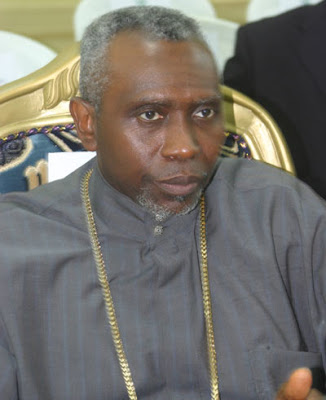By Promise Uzoma Okoro,Abuja
General Overseer of Word of Life Bible Church Warri Pastor Ayo Oritsejafor Bishop Mike Okonkwo of The Redeemed Evangelical Mission Pastor Matthew Ashimolowo Kingsway International Christian Centre and other will in days to come step down as the General Overseers of their Different Church.
This is Inline with the Corporate Governance Code (For Not-for-Profits) which was revised in October 2016 said that Founders/Leaders of Not for Profit Organisations should resign after spending “more than 20 years (in office) or is age 70 years and above”.
It will be recalled that Pastor E.A Adeboye yesterday resigned as the General Overseer of Redeem Christian Church Of God in adherence to the New Law.
The need for the action is as a result to the new legal requirements set up by the Federal Government of Nigeria through its (Financial Reporting Council of Nigeria), guiding all registered churches, mosques, CSOs etc. It allows leaders of religious organization(s) to have a maximum period of twenty years to lead their organization(s). In retirement, they are not permitted to hand over to their families amongst other rules. The Church why making clarification on the development said
Pastor E. A. Adeboye and the Redeemed Christian Church of God have set a standard in the decision to obey the laws of the nation which is the reflection of the scriptural teaching that all constituted authority should be respected
The law also says that it understands the “spiritual role” leaders play in religious organisations, but added that these roles are “distinguishable from corporate governance and management responsibilities”.
It also said that to ensure the Founder/Leader’s continuous advisory and spiritual role, the organisation can create a Board of Trustees (BOT) and make the Founder/Leader the First or Life Chair.
See excerpts of the code below:
These are the relevant provisions of the Corporate Governance Code of the Financial Reporting Council that hit not-for-profit organizations especially the Churches and Mosques like a Tsunami.
“9. Position of the Founder or Leader
9.1. The Founder or Leader of a NFPO occupies a special position in the Organisation and is committed to the success and longevity of the NFPO. Accordingly, a Founder or Leader should not take on too many responsibilities in the organisation or have an indefinite term in the running of the organisation.
9.2. Where for any reason, a Founder or Leader of NFPO also occupies any of the three governance positions of Chairmanship of the Board of Trustees, the Governing Board or Council, and the Headship of the Executive Management (or their governance
equivalents), the following provisions shall apply before the end of the organization’s financial year in which this Code takes effect.
9.2.1. The Founder or Leader shall cease to occupy these three governance positions simultaneously. This is to ensure the separation of powers and avoid possible concentration of powers in one individual.
9.2.2. The Founder or Leader may however choose – subject to the agreement of the organization’s apex authority as expressed in the Annual General Assembly, Annual Meeting, Annual Stakeholder Engagement, Annual Conference, Annual Synod, Annual Fellowship Assembly or their equivalents – only one of these three governance positions subject to his current tenure. This is to ensure a clear division of responsibilities at the head of the organization between the running of the governing body and the executive responsibility for the management and fulfilment of the organization’s mission.
9.3. Where the Founder or Leader has occupied all or any of these three governance positions for more than twenty years, or is aged seventy years or above, the choice in section 9.2.2 above should only relate to the Board of Trustees as in section 9.4(c) below, except the constitution of the organisation otherwise provides.
In the case of religious or cultural organisations, nothing in this code is intended to change the spiritual leadership and responsibilities of Founders, General Overseers, Pastors,
Imams and Muslim Clerics, Presidents, Bishops, Apostles, Prophets, etc. which are distinguishable from purely corporate governance and management responsibilities and accountabilities of the entities.
9.4. Conflicts with Founders or Leaders should therefore be addressed by:
(a) recognising and respecting past achievements and strategy of the Founder or Leader with assurances that change has become inevitable to enable his dream live on;
(b) making provisions if not already in existence, or drawing the Founder’s or Leader’s attention to the maximum tenure already stipulated by the Charter and imploring the Founder or Leader to respect it;
(c) considering and ensuring Founder’s or Leader’s continued advisory or spiritual role by creating a Board of Trustees (BOT) for which the original Founder or Leader can become the First or Life Chair; and
(d) elevating deserving and senior members of the organisation to the Board of Trustees.
10. Role of the Chairman of the Governing Board
10.1. There should be a Chairman for the board of every NFPO.
10.2. The primary responsibility of the Chairman is to ensure the effective operation of the board such that the board works as a group towards achieving the NFPO’s strategic objectives.”
This new law will see many religious leaders in Nigeria relinquish (or not) their positions as many of them have served in such positions for more than 20 years
Daniel Kolawole Olukoya of the Mountain of Fire and Miracles Ministries, has spent 22 years as the General overseer; Bishop Mike Okonkwo of The Redeemed Evangelical Mission (35 years); Pastor Kumuyi (43 years); Pastor Ayo Oritsejafor of Word of Life Bible Church (29 years); Rev. Chris Okotie of the Household of God ( 29 years); Kingsway International Christian Centre’s Pastor Matthew Ashimolowo (24 years); Winners Chapel’s Bishop David Oyedepo (35 years)
